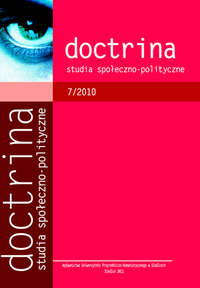Zdolności wywiadowcze Organizacji Narodów Zjednoczonych
Abstrakt
Defining precisely what constitutes the United Nations intelligence capabilities is difficult. By definition the UN has to be a transparent organization and it is suggested that the world „intelligence” should be banned from the terminology of the UN because the term associates with illegal or undercover activities. In accordance with the traditional attitude within the UN system intelligence gathering is contrary to the open nature of the UN system and is therefore absolutely forbidden. Reform documents such as „An Agenda for Peace” and the „Brahimi Report”, describe tasks that include early-warning information gathering and the need to provide for preventive steps based upon timely and accurate knowledge of facts. Other roles have included information for the understanding of developments and global trends based on analysis, and the need to integrate intelligence assets into the UN's decision processes. Whether the term „intelligence” or „information” is used to describe knowledge, the UN already has wellestablished information and analysis systems. Intelligence in peace operations has to be able to support several primary goals: first, gain public confidence though a winning the hearts and minds or at least create passive acceptance the UN activities; second, prevent misinformation spread by the indigenous paramilitary faction and purposely or spontaneously generated rumours about UN operation; third, protect deployed personnel and minimize damages. In peace intelligence allows respond to direct and indirect threats having in mind potential UN deployment. Intelligence is a vital component of ‘soft’ political, economic, psychological, and moral power, supported by information operations, careful intelligence work, and surgical precision at the more direct military or police level. Intelligence has a strong role to play in supporting policy-makers attempting to negotiate solutions to divided communities. Many failures in the history of UN field operations might have been avoided if the UN had taken a more decisive approach to intelligence and possessed a stronger mandate to gather information and improve its information-gathering systems.




